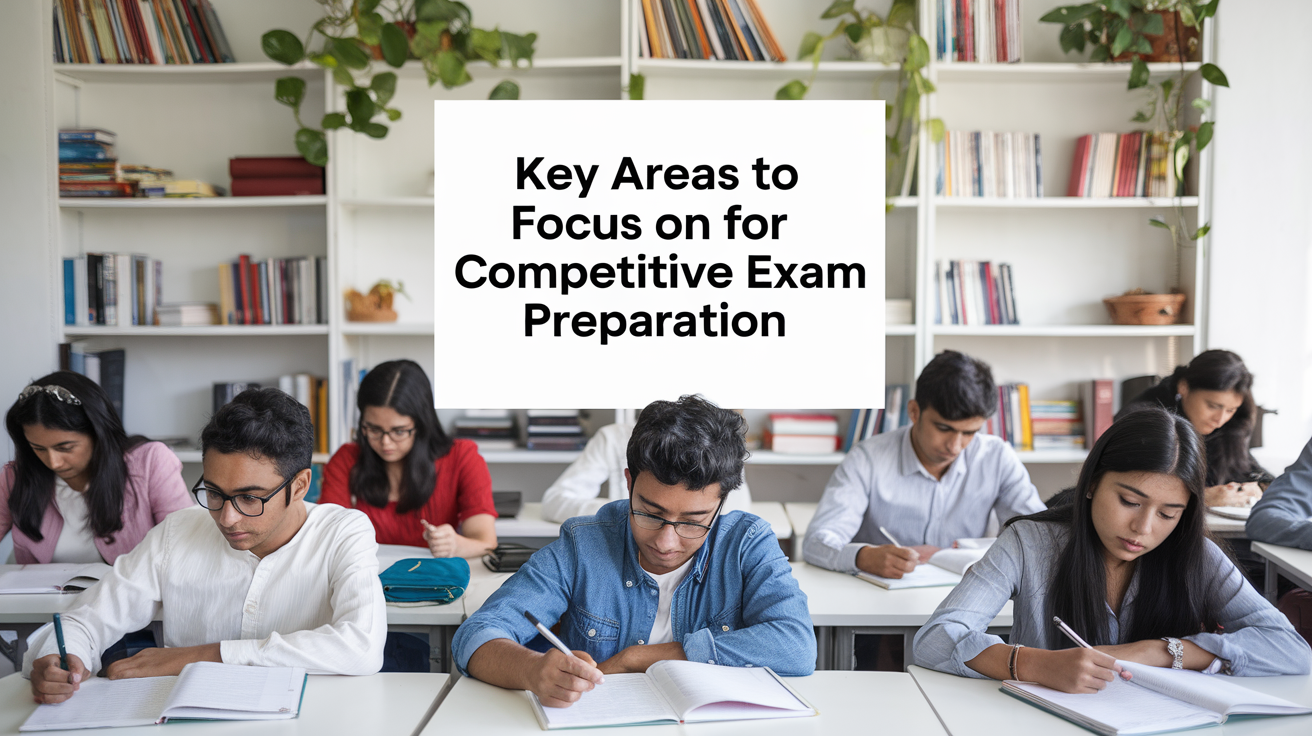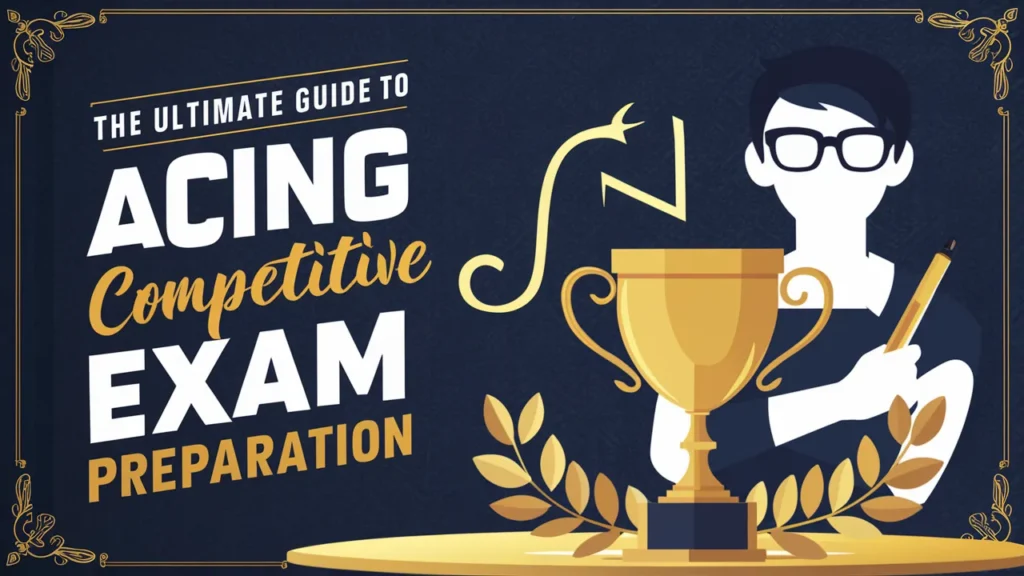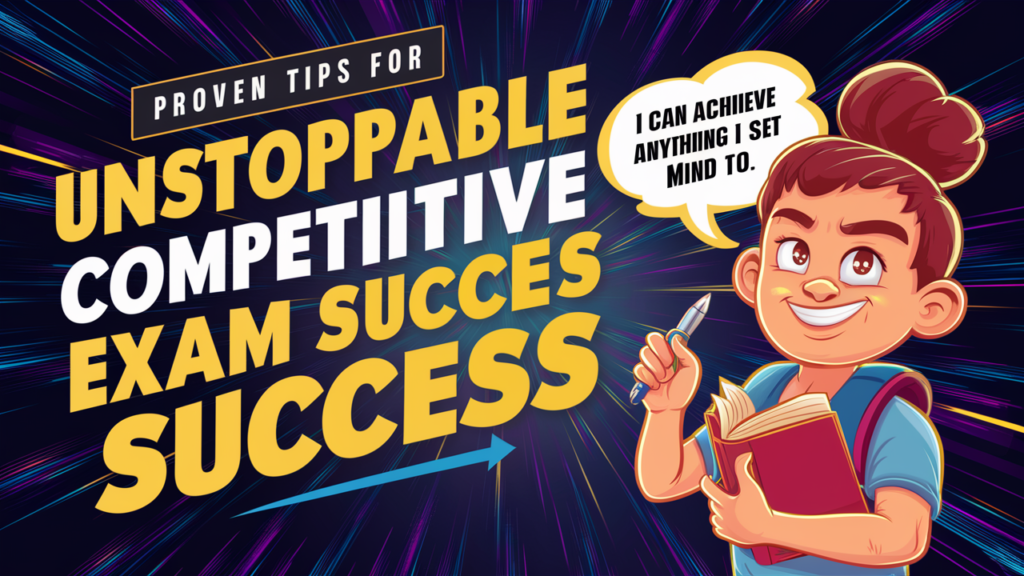
Competitive exams are an essential milestone for students aspiring to pursue their dreams of entering top-tier educational institutions or landing coveted government jobs. Whether it’s exams like the UPSC, GRE, GMAT, CAT, or JEE, excelling in them requires an in-depth understanding of key areas and a strategic approach to preparation. With vast syllabuses, time constraints, and high levels of competition, it is crucial to identify where to focus your efforts.
In this blog post, we’ll discuss the key areas to focus on during your competitive exam preparation that will help you stay ahead of the curve. We will also offer practical tips on how to improve in each of these areas to boost your chances of success.
1. Understanding the Exam Pattern and Syllabus
Before you start preparing for any competitive exam, the first and most crucial step is to thoroughly understand the exam pattern and syllabus. Competitive exams usually cover a broad range of topics, and each exam has its own unique structure.
Why this is important:
- Exam Pattern: Knowing the exam structure (sections, number of questions, time limit, negative marking, etc.) helps you allocate time and resources accordingly.
- Syllabus: The syllabus will help you focus your preparation on the right topics and avoid wasting time on areas that aren’t covered.
How to get started:
- Visit the official website of the exam to download the latest syllabus and pattern.
- Create a topic-wise checklist based on the syllabus, and mark the important and high-weightage topics.
- Focus more on topics that have been frequently asked in previous years’ exams.
2. Time Management
Effective time management is essential when preparing for competitive exams. Not only do you need to divide your study hours efficiently across different subjects, but you also need to practice solving questions within the given time limit.
Why this is important:
- Most competitive exams test your ability to solve questions quickly and accurately.
- Managing your time well ensures that you cover the entire syllabus without burnout or stress.
Tips for better time management:
- Create a study schedule that allocates time to each subject based on its importance and difficulty level.
- Set realistic goals for each day, week, and month.
- Take mock tests to practice completing questions within the time limit, and adjust your speed accordingly.
3. Conceptual Clarity
While many students focus on memorizing facts, true success in competitive exams comes from having a deep understanding of the fundamental concepts. Whether it’s mathematics, science, economics, or any other subject, having strong conceptual clarity will help you tackle tricky questions more easily.
Why this is important:
- Exams often test your understanding of core concepts rather than rote memorization.
- Conceptual clarity allows you to solve problems more quickly and confidently during the exam.
How to improve conceptual clarity:
- Study each topic thoroughly, focusing on understanding the underlying principles.
- Use reference books, online resources, and tutorials to clear your doubts.
- Solve a variety of problems, including challenging questions, to reinforce your understanding.
4. Practice and Mock Tests
Practice makes perfect—this holds true for competitive exam preparation. Regular practice and taking mock tests are vital components of a well-rounded study plan.
Why this is important:
- Mock tests simulate the actual exam environment, helping you manage exam-day stress.
- Practicing a variety of questions helps you identify your strengths and weaknesses.
- Regular practice improves your speed and accuracy, which is crucial for time-bound exams.
How to incorporate practice into your preparation:
- Take weekly mock tests to assess your progress and improve your time management.
- Analyze your test results to identify the areas where you’re losing marks and work on them.
- Practice previous years’ question papers to get a sense of the types of questions asked.
5. Focus on High-Weightage Topics
Every competitive exam has a few high-weightage topics that contribute to a significant portion of the total marks. Identifying and mastering these topics should be a priority in your preparation.
Why this is important:
- High-weightage topics can give you an edge over other candidates if you score well in them.
- Prioritizing these topics ensures that you’re maximizing your score potential.
How to identify and focus on high-weightage topics:
- Review the previous years’ question papers to find the topics that are asked frequently.
- Allocate more time to mastering these areas, while still ensuring that you cover the rest of the syllabus.
- Use quick revision notes for these topics, so you can review them regularly.
6. Revision Strategies
Once you’ve covered the syllabus, it’s important to devote adequate time to revision. Revisiting topics multiple times ensures that the information stays fresh in your mind.
Why this is important:
- Regular revision helps reinforce what you’ve already studied, making it easier to recall information during the exam.
- Revision helps prevent forgetting important concepts and formulas.
Tips for effective revision:
- Create summary notes for each topic, focusing on key formulas, facts, and concepts.
- Use flashcards or mind maps to revise quickly.
- Set aside dedicated revision days in your study schedule, especially as the exam date approaches.
7. Building Mental Stamina
Competitive exams are often long and mentally exhausting. Maintaining focus and concentration throughout the exam is crucial to performing well. Therefore, building your mental stamina is just as important as studying the material.
Why this is important:
- Many students lose marks not because they don’t know the answers, but because they can’t maintain focus under pressure.
- Mental stamina helps you remain calm and focused, even during tough sections of the exam.
Tips for building mental stamina:
- Take mock exams under timed conditions to practice staying focused for long periods.
- Incorporate breaks and physical activity into your daily routine to avoid burnout.
- Practice meditation or deep breathing exercises to manage stress and anxiety.
8. English Language and Communication Skills
In many competitive exams, especially those for higher education or professional jobs, there is a section dedicated to English language skills. This includes grammar, reading comprehension, and vocabulary.
Why this is important:
- Good command of the English language is essential for performing well in both the written and interview stages of competitive exams.
- Strong communication skills also enhance your performance in group discussions and personal interviews.
How to improve English skills:
- Read newspapers, books, and magazines regularly to improve your vocabulary and comprehension.
- Practice reading comprehension and grammar exercises daily.
- Make a habit of writing essays or summaries to improve your written communication.
9. Staying Physically and Mentally Healthy
It’s easy to overlook your health when preparing for a competitive exam, but staying physically and mentally fit is critical to your overall success. A healthy mind and body can significantly improve your focus, memory, and stress management.
Why this is important:
- A healthy lifestyle enhances brain function and memory retention.
- Regular exercise and a balanced diet improve energy levels and reduce stress.
Tips for maintaining health:
- Incorporate at least 30 minutes of exercise into your daily routine.
- Sleep for at least 7-8 hours per night to help your brain process and retain information.
- Eat a balanced diet rich in fruits, vegetables, and whole grains to keep your body and mind in peak condition.
Conclusion
Preparing for a competitive exam requires a well-rounded approach that includes understanding the syllabus, managing time effectively, mastering high-weightage topics, and staying mentally and physically healthy. By focusing on these key areas and incorporating regular practice and revision, you’ll be well on your way to achieving success.
Remember, competitive exams are a marathon, not a sprint. Stay consistent, stay focused, and success will follow!


